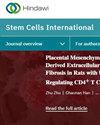采用从单层到三维的顺序策略,快速、高效、普遍地进行肠道类器官基因工程改造
IF 3.3
3区 医学
Q2 CELL & TISSUE ENGINEERING
引用次数: 0
摘要
人们正在探索将转基因肠道器官组织作为永生细胞系和基因工程动物的潜在替代物。然而,对肠器官组织进行基因操作耗时较长,而且效率远不能令人满意。为了确保转基因器官组织的产量,需要大量的起始材料,而且整个过程通常需要 10 多天。制约基因传递效率的两大障碍是三维培养条件和在细胞悬浮液中进行基因传递。在本研究中,我们介绍了一种构建转基因肠道器官组织的新型高效策略,即在二维条件下,在新鲜的单层原代肠上皮细胞中进行基因递送,然后将其转化为三维器官组织。整个过程可在 10 小时内完成,效率远远高于传统方法。此外,在建立高纯度转基因肠道器官组织之前,这种策略还能在单层条件下筛选转基因细胞。本文章由计算机程序翻译,如有差异,请以英文原文为准。
Rapid, Efficient, and Universally Applicable Genetic Engineering of Intestinal Organoid with a Sequential Monolayer to Three-Dimensional Strategy
Genetically modified intestinal organoids are being explored as potential surrogates of immortalized cell lines and gene-engineered animals. However, genetic manipulation of intestinal organoids is time-consuming, and the efficiency is far beyond satisfactory. To ensure the yield of the genetically modified organoids, large quantity of starting materials is required, and the procedure usually takes more than 10 days. Two major obstacles that restrict the genetic delivery efficiency are the three-dimensional culture condition and that the genetic delivery is carried out in cell suspensions. In the present study, we introduce a novel highly efficient strategy for building genetically modified intestinal organoids in which genetic delivery was performed in freshly established monolayer primary intestinal epithelial cells under two-dimensional conditions and subsequentially transformed into three-dimensional organoids. The total procedure can be finished within 10 hr while displaying much higher efficiency than the traditional methods. Furthermore, this strategy allowed for the selection of transgenic cells in monolayer conditions before establishing high-purity genetically modified intestinal organoids.
求助全文
通过发布文献求助,成功后即可免费获取论文全文。
去求助
来源期刊

Stem Cells International
CELL & TISSUE ENGINEERING-
CiteScore
8.10
自引率
2.30%
发文量
188
审稿时长
18 weeks
期刊介绍:
Stem Cells International is a peer-reviewed, Open Access journal that publishes original research articles, review articles, and clinical studies in all areas of stem cell biology and applications. The journal will consider basic, translational, and clinical research, including animal models and clinical trials.
Topics covered include, but are not limited to: embryonic stem cells; induced pluripotent stem cells; tissue-specific stem cells; stem cell differentiation; genetics and epigenetics; cancer stem cells; stem cell technologies; ethical, legal, and social issues.
 求助内容:
求助内容: 应助结果提醒方式:
应助结果提醒方式:


